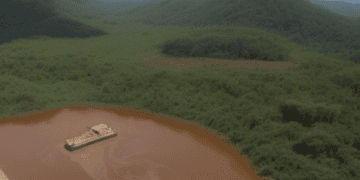In Brazil’s Para region, a Canadian mining company’s plan to construct an open-pit gold mine has raised concerns among activists and Indigenous communities. The proposed project by Belo Sun Mining Corp covers over 2,400 hectares (5,930 acres) in the Amazon, an area rich in gold and home to various Indigenous peoples, including the Juruna, Arara, Xipaya, and Xikrin, as well as riverine communities.
Lorena Curuaia, a leader of the Curuaia Indigenous people, expressed concern that the project threatens their ancestral territories, potentially displacing communities that have lived there for thousands of years.
The Volta Grande Gold Project by Belo Sun aims to extract about six tonnes of gold annually over 17 years. The project includes two open-pit mines, a tailings dam for chemical waste, and other facilities like an explosives storage and lodging. Despite having received initial approval, the construction license was suspended by a Brazilian court, citing an inadequate socio-environmental impact assessment. The project’s future remains uncertain as it awaits further review.
Environmentalists and researchers have warned of the potential ecological impact on the Xingu River, which sustains the Amazon rainforest and supports 25,000 Indigenous people from 18 ethnic groups. The proposed tailings dam, deemed high-risk by experts due to its proximity to geological faults, could have catastrophic consequences in the event of a failure.
Belo Sun, however, has refuted claims of potential danger, stating that their methodology differs significantly from older dam projects like Mariana and Brumadinho, which experienced disastrous collapses.
The Articulation of Indigenous Peoples of Brazil (APIB) has accused Belo Sun of rights violations, citing the adverse effects of another project, the Belo Monte hydroelectric dam, on local communities. The group’s report argues that the mining project will further exacerbate the region’s ecological and humanitarian crises.
Critics, including Amazon Watch, have questioned the adequacy of the consultation process conducted by Belo Sun, arguing that it should have been carried out by state officials according to community norms. They also raise concerns about the potential displacement of local families due to land acquisition for mining exploration.
Belo Sun maintains that it has complied with Brazilian law and regulations, including environmental studies and community consultations. However, the continuation of the project poses existential threats to Indigenous communities and the region’s delicate ecosystem, as highlighted by Curuaia and other local leaders.
Discover comprehensive supply chain report news insights at The Supply Chain Report. For international trade resources, visit ADAMftd.com.
#BeloSunMining #VoltaGrandeGoldProject #IndigenousRights #AmazonConservation #ParaRegion #XinguRiver #EcologicalImpact #BrazilMining #ProtectTheAmazon #CommunityConsultation #EnvironmentalJustice #SustainableDevelopment #IndigenousLandRights #GoldMiningImpact #BeloSunResponse #AmazonIndigenous #SaveTheXinguRiver #ArticulationOfIndigenousPeoplesBrazil #Juruna #Arara #Xipaya #Xikrin #EnvironmentalProtection #StopDeforestation #ProtectAmazonCommunities















